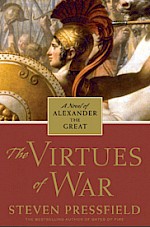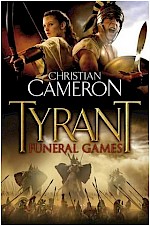Hellenistic warfare in fiction
The Hellenistic world is a great background for historical novels. Not only is the sudden and unsolved death of Alexander the Great a good source for suspense, the larger than life struggles of successors, their intrigues and romances are also a fertile ground to base an epic adventure on. The Hellenistic world up to and including the period of the tragic death of Cleopatra VII of Egypt, still excites many novelists and readers. Let’s review a few of books set in this era.

Many novels have been written about Alexander the Great. So many in fact, that it is impossible to mention them all. We can try to mention some. There is the subtle trilogy of Mary Renault (Fire from heaven (1969), the Persian boy (1972) and Funeral Games (1982)) which does not shun the homosexual freedom of the time. The splendid Virtues of War (2004) and The Afghan Campaign (2006) by Steven Pressfield present the reader with exciting descriptions of the battles and campaigns of Alexander. Then there are the 1998 novels (Child of a Dream, Sands of Ammon, and Ends of the Earth) by the celebrated Italian historian and writer Valerio Massimo Manfredi. Or the very mythical - or mystical if you prefer - novels Lion of Macedon (1990) and Dark Prince (1991) by the acclaimed fantasy writer David Gemmell. Or you might like the dark view of Alexander in Nicholas Nicastro’s Empire in Ashes (2004). Scott Oden wrote Memnon (2006), telling the story from the point of Alexander’s opponent Memnon of Rhodos during the early stages of the conquest of Persia. Also interesting is the crime novel The House of Death (2001) by Paul Doherty. In it, the author narrates the adventures of a fictional friend of Alexander helping him to find a murderer in his camp. This novel was followed by The Godless Man (2002) and Gates of Hell (2003).
The dominant character of Alexander the Great might cast a shadow on novels taking place in the Hellenistic world, much like the results of his conquest of Persia influenced the Greek and Persian world for decades after his death, if not for centuries… But there are (and were) very interesting stories set in that period too, of which I’d like to present some…
Let’s start with the eventful period just after the unexpected death of Alexander the Great. The terrible wars for the ultimate prize, the empire of Alexander the Great, fought by his Macedonian generals is described in the novel Funeral Games (1982) by Mary Renault. It gives an inside view of these events up until about 286 BC and includes the death of the family of Alexander (Olympias his Epirote mother, Roxanne his wife and Alexander IV his son) and the main players of the early successor wars (Polyperchon, Eumenes, Craterus, but also Ptolemy, Cassander, Seleucus, Antigonos Monophthalmos and Demetrius Poliorcetes). Marie Renault has also written a biography of Alexander called The Nature of Alexander the Great, which shows much psychological depth.
Als interesting is the novel Elephants and Castles (1963) by Alfred Duggan, which tells the story of Demetrius Poliorcetes, son of Antigonos Monophthalmos and father Antigonos Gonatas, first ruler of the Antigonid dynasty which ruled Macedon until 168 BC. Though a bit old-fashioned in its style (the book is also out of print now), it can still be found and gives a good insight into the treacherous and selfish ‘new world’ that the generals of Alexander created. Set in a later Hellenistic era is Duggan’s He died old (1958) that deals with the life of Mithridates.
The Hellenic Traders is a more recent (fictional) series by H.N. Turteltaub (pseudonym H.N.Turtledove). It covers the lives of two cousin merchants travelling in the eastern Mediterranean in the first decades after the death of Alexander the Great. The series consists of Over the Wine Dark Sea (2001), The Gryphon’s Skull (2002), The Sacred Land (2003), and Owls to Athens (2004).

Even more recent is the Tyrant series by Christian Cameron. Tyrant (2008) and Storm of Arrows (2009) are the first two novels of this series, which concerns the history of a royal family from the Euxine region whose life is much influenced by the wars of Alexander and his successors. Cameron, a former soldier himself, describes the daily routines and fears of the fugitive brother and sister in the third installment, Funeral Games (2010) very well. His view on phalanx battles is unorthodox, but interesting to say the least. Climax is the battle of Gaza in 312 BC. All in all a very good author if you are interested in ancient warfare. Three more novels have been announced: King of the Bosporus (2011), Besieger of Cities (2012), and Force of Kings (2013).
A Dutch book by Helene Nolthenius’ Voortgeschopt als een steen (1999) might interest the Dutch-reading readers. Her excellent literary piece of work tells us about the life of the poet Leonidas of Taras and his ambivalent connection with the warrior king Pyrrhus of Epirus.
After the early Successor period we make a chronological jump of some hundred years, when the Successor empires were firmly set. Though some novels take place in this world, I will skip this period in this article. Interesting times - as the Chinese say - mostly involve times of war and great power shifts. So now Rome enters the picture, and their conquest of the successor empires after the second Punic war against Carthage gives rise to another bunch of historical novels.

Michael Curtis Ford’s The last king (2004), about the Mithridates of Pontus and his struggles against the ever growing Roman republic shows special interest in military themes and his description of the Hellenistic Mithridates is convincing.Colleen McCullough has written a large series about the late Roman Republic from the Consul Marius until the emperor Augustus. Although you might not expect books on Roman consuls and their wars from the writer of the TV series Thorn Birds, McCullough is able to drag the reader into the harsh political world of Republican Rome and life during their military campaigns. The Masters of Rome series (The First Man in Rome, The Grass Crown, Fortune’s Favorites, Caesar’s Women, Caesar, The October Horse and Antony and Cleopatra) are indeed a masterpiece. For our Hellenistic point of view The grass crown (1991) is most interesting because of the wars against Mithridates VI of Pontus and Tigranes II of Armenia. The October Horse (2002) relates the story of Julius Caesar’s relation with Cleopatra and it is obvious what the subject of Anthony and Cleopatra is…
The death of Cleopatra VII in 30 BC marks the final end of the Hellenistic era. As can be expected, Cleopatra has been a great inspiration for writers. There are many novels about her life, from William Shakespeare to recent novelists. They mostly focus on the political and love life of the last Ptolemaic queen of Egypt and not so much on her military exploits. To name a few: The Memoirs of Cleopatra (1997) by Margaret George set up like a diary; When We Were Gods: The Story of Cleopatra (2001) by Colin Falconer; Hand of Isis (2009) by Jo Graham focuses on the queen and her two fictional half sisters; Cleopatra’s Heir (2002) by Gillian Bradshaw tells us what might have happened if Caesarion survived. Finally, Cleopatra Dismounts (2001) by Carmen Boullosa gives us a poetic view of Cleopatra.
The Hellenistic world, after more than 2000 years still inspires the most creative minds in our society. Hopefully I inspired you to read some of these great books.
Richard Evers is too modest to mention that he wrote a Dutch novel that falls smack-bang in the middle of this period: Pyrrhus: De Arend Koning is a 700-page novel about the adventures of Pyrrhus of Epirus, firmly based on known historical details.
